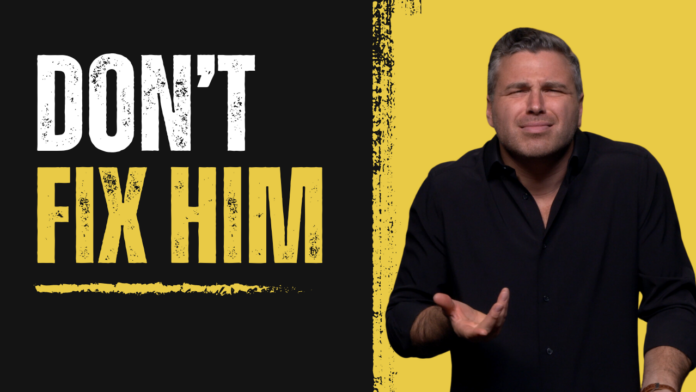[ad_1]
Notes from the podcast:
In relationships, a hard truth remains: no one is perfect. This acknowledgment sets the stage for a phenomenon I’ve come to call the “Near Miss” phenomenon, where apps and social encounters introduce us to potential partners who tick most of the boxes yet seem to fall just short in certain areas. In these gaps, many of us, armed with the best intentions, fall into the trap of believing we can mold, shape, and ultimately ‘fix’ these near misses into our ideal partner. But here’s a crucial intervention: Stop. Just stop.
This strategy, though often embarked upon with the purest of intentions, is fraught with pitfalls and destined for poor outcomes.
Why the Fixing Mentality Takes Hold
The impulse to fix can stem from various places, often benign and empathetic at their core. For one, there’s the “Savior Complex” – a surplus of empathy and a deep-seated need to prove one’s goodness by being the indispensable lifeline for someone perceived as in dire need of saving. This mindset burdens you with an unwarranted responsibility and strips the other person of their agency and accountability for their own life.
Then there’s the allure of playing the expert, where the motivation to fix is driven by a desire to showcase superiority, knowledge, and leadership. While asserting a role and demonstrating personal growth expertise can be empowering, imposing these qualities upon someone as a form of relationship improvement is ineffective and often counterproductive.
The Case Against Fixing Your Partner
Attempting to fix someone presupposes that they need fixing – a presumption that’s not only presumptuous but can border on the obnoxious. It’s essential to question the validity of the desired change: is it genuinely beneficial, and more importantly, is it sought after by the partner?
Moreover, the foundation of loving relationships isn’t conditional love. The notion of “I’ll love you if…” introduces conditions into the relationship that can erode its very essence. Attempting to change a partner often targets those perceived as vulnerable, further destabilizing the relationship through resentment, guilt, and a decreased sense of self-worth.
Editor’s note: Ready to attract love with a proven strategy? Watch this free video to learn the 7 powerful steps
Additionally, the harsh truth is that most of us aren’t as adept at facilitating change in others as we might believe. Effective, lasting change requires a nuanced understanding, skills, and patience—qualities that are professional domains rather than personal obligations.
Conclusion: Embrace, Don’t Fix
In conclusion, the journey towards fostering a healthy relationship is paved with mutual respect, acceptance, and unconditional love, not a relentless pursuit of remodeling your partner into an idealized version. While the impulse to fix may stem from a place of love, its execution can lead to resentment, a loss of individuality, and, ultimately, a fractured relationship.
So, rather than aiming to fix your partner, focus on building a foundation of support, understanding, and respect that celebrates your imperfections and strengths. After all, the most enduring relationships embrace, rather than attempt to erase, the flaws that make us human.
[ad_2]
lovestrategies.com








